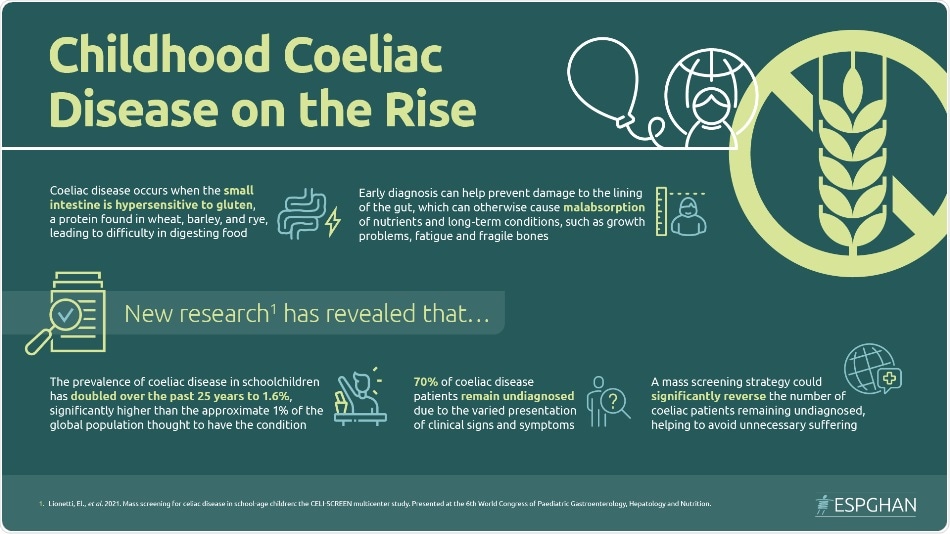Mass screening of school age children has led to significantly higher numbers of coeliac disease cases being diagnosed, according to a new study presented today at the 6th World Congress of Pediatric Gastroenterology, Hepatology and Nutrition.

Image Credit: ESPGHAN Communications
Researchers in Italy found double the number of cases of the autoimmune disease – where the body produces antibodies to gluten, a protein found in wheat, barley, and rye – in school children compared to a similar study by the same group 25 years ago.
A new screening program of 7,760 children aged from five to 11 in eight provinces of Italy found that the overall prevalence of coeliac disease was 1.6%, much higher than the approximate 1% of the global population thought to be currently affected by the condition. The children were screened with a finger-tip blood test for Human Leukocyte Antigens (HLA) gene mutations which predisposes a child to developing coeliac disease. If they tested positive the children were then checked for antibodies to gluten. Diagnosis was then confirmed using the ESPGHAN (European Society for Pediatric, Gastroenterology, Hepatology and Nutrition) criteria.
Lead author of the CELI SCREEN multi-center trial, Prof. Elena Lionetti, says the study showed that screening in childhood leads to more cases of coeliac disease being diagnosed than in standard care (where children are tested if they present with symptoms, or are screened because of a family history of the disease).
‘Our study showed that prevalence of coeliac disease in schoolchildren has doubled over the past 25 years when compared to figures reported by our team in a similar school age group,’ says Prof. Lionetti. ‘Our sentiment is that there are more cases of coeliac disease than in the past, and that we could not discover them without a screening strategy.’
At the moment 70% of coeliac disease patients are going undiagnosed and this study shows that significantly more could be identified, and at an earlier stage, if screening were carried out in childhood with non-invasive screening tests. Diagnosis and avoiding gluten could potentially prevent damage to the villi (finger-like projections that line the gut), which can lead to malabsorption of nutrients and long-term conditions such as growth problems, fatigue and osteoporosis (a fragile bone condition). The study has shown that screening is an effective tool for diagnosing coeliac disease in children which could potentially help avoid a lot of unnecessary suffering from what can be a hard-to-detect condition."
Prof. Elena Lionetti, Lead author of CELI SCREEN multi-center trial
Commenting on the research, Tunde Koltai, who is Chair of AOECS (Association of European Coeliac Societies) and Patient Representative of the ESPGHAN Public Affairs Committee, added: ‘This new study adds to the growing evidence base that the number of people in Europe with coeliac disease is rising, yet many still remain undiagnosed. It is essential that we adopt an effective screening strategy for coeliac disease across Europe to ensure children and the wider population are diagnosed as early as possible so that they can have the best possible quality of life’.
Coeliac disease is caused by the body producing antibodies to gluten, a protein found in wheat, barley, and rye and used to make foods including bread, pasta, biscuits, cake, and some breakfast cereals. The antibodies damage the gut lining causing symptoms such as bloating, pain, diarrhoea, anemia, and other conditions connected to malabsorption of nutrients, including fatigue, anemia, osteoporosis, and fertility problems. In infants and children, coeliac disease can cause abdominal pain, bloating, and vomiting, as well as lead to poor growth and delay puberty.
Coeliac disease is one of the most common lifelong conditions in European countries. Following a strict gluten-free diet is an effective treatment, causing symptoms to disappear and gut damage to gradually heal.
Source:
Journal reference:
Lionetti, E. l., et al. (2021) Mass screening for celiac disease in school-age children: the CELI-SCREEN multicenter study.